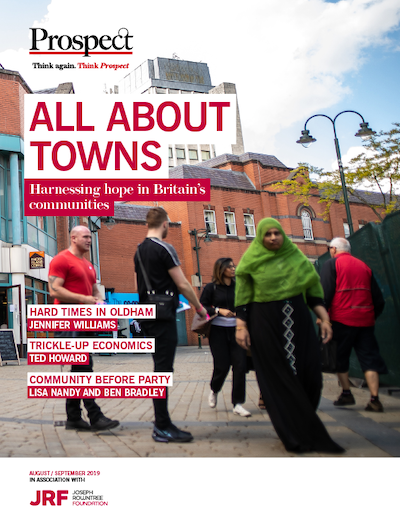
A generation ago the term “inner cities” was code for life on the wrong side of the tracks. Since then, happily, the metropolis has fought back. It’s not just inner London, but also the hearts of Manchester, Bristol, Leeds and other great English cities that have enjoyed a renaissance. Inequality and hardship are stubborn, to be sure, but the expanding universities and canal-side developments cannot be missed, and bear testimony to an extraordinary energy.
But if the 21st century has been kind to many cities, it has been much less so to many towns. While infrastructure projects have been concentrated in the conurbations, there are aging and sometimes shrinking populations in many smaller communities. The high streets that gave many of them a vibrancy are hollowing out, and indicators of health and education point to overlapping problems. Prospect could not be prouder to partner with the Joseph Rowntree Foundation for this special report to take stock of where our towns stand—and how to turn them round.
Coastal communities, such as Blackpool—whose problems were poignantly documented by Sarah O’Connor in a Financial Times piece that won the JRF/Orwell prize—have rightly been under the spotlight. Less attention has been given to those more numerous towns that live within the embrace (or, as they may see it, under the shadow) of a neighbouring giant. Here we address that gap, with the award-winning journalist Jennifer Williams’s passionate and in-depth dispatch from Oldham taking centre stage, powerfully supported by Joel Goodman’s photography.
Williams goes to foodbanks and night shelters and finds all the hardship that you would expect from Oldham’s grim statistics (which Ian Warren displays here). But with open eyes and ears, she also finds a remarkable spirit of solidarity and enterprise. One inspiring local voice she speaks to, Majid Hussain, writes for us and describes how he marshals armies of volunteers to do extraordinarily ambitious things.
Anand Menon and Matthew Bevington report on JRF-funded research that shows while Brexit dominates the headlines, people are deeply concerned about the things that build cohesive communities: good jobs, low crime and quality housing; while Mike Hawking from the Joseph Rowntree Foundation distils the lessons for public policy. Ted Howard looks at the practical ways in which places like Cleveland, Ohio and Preston, Lancashire, have been creating a new local-first economics, and pulling themselves up by the bootstraps in the process.
Bill Clinton made great play of the town of his birth when he said “I still believe in a place called Hope.” If downbeat officials and analysts only take the time to listen—really listen—to the people in even the most deprived of English towns, they might just find they can remember how to hope as well.
Plus:
Lisa Nandy and Ben Bradley: The revival of British towns should be a cross-party mission
Ben Chu—Time for a great rebalancing
Bob Kerslake—Don't forget the regional dimension













